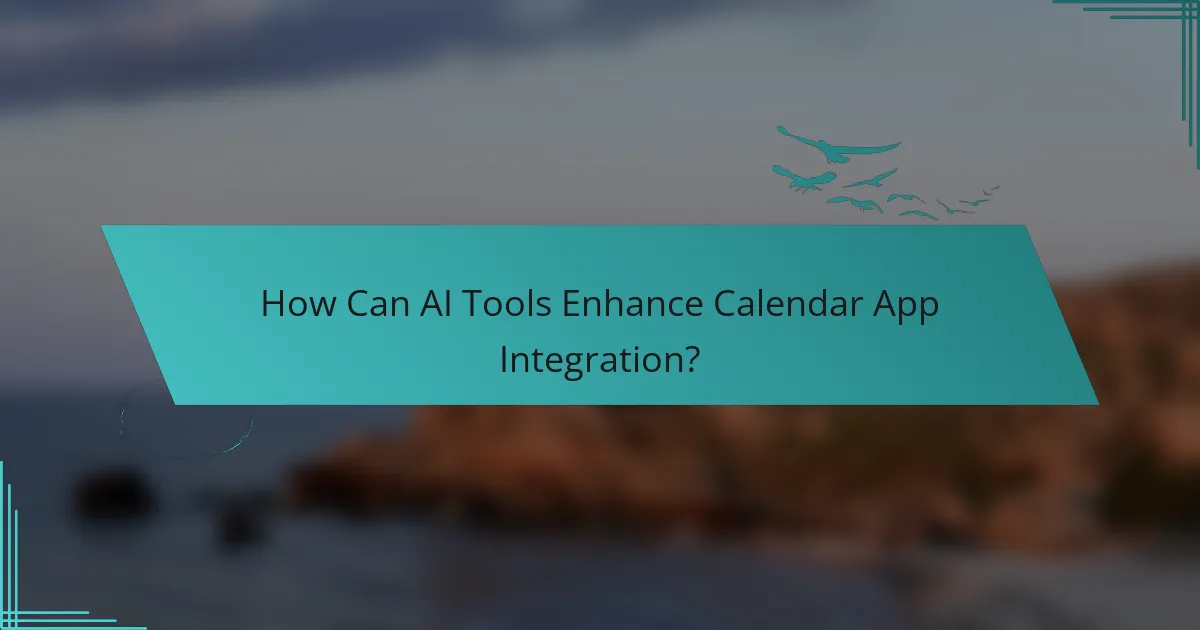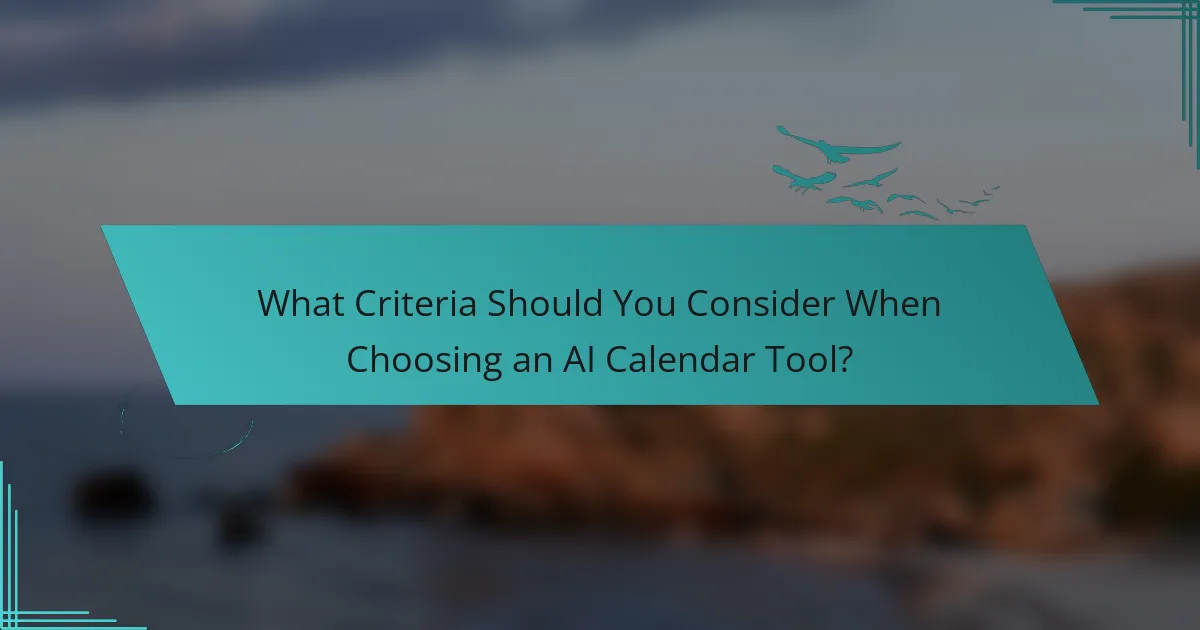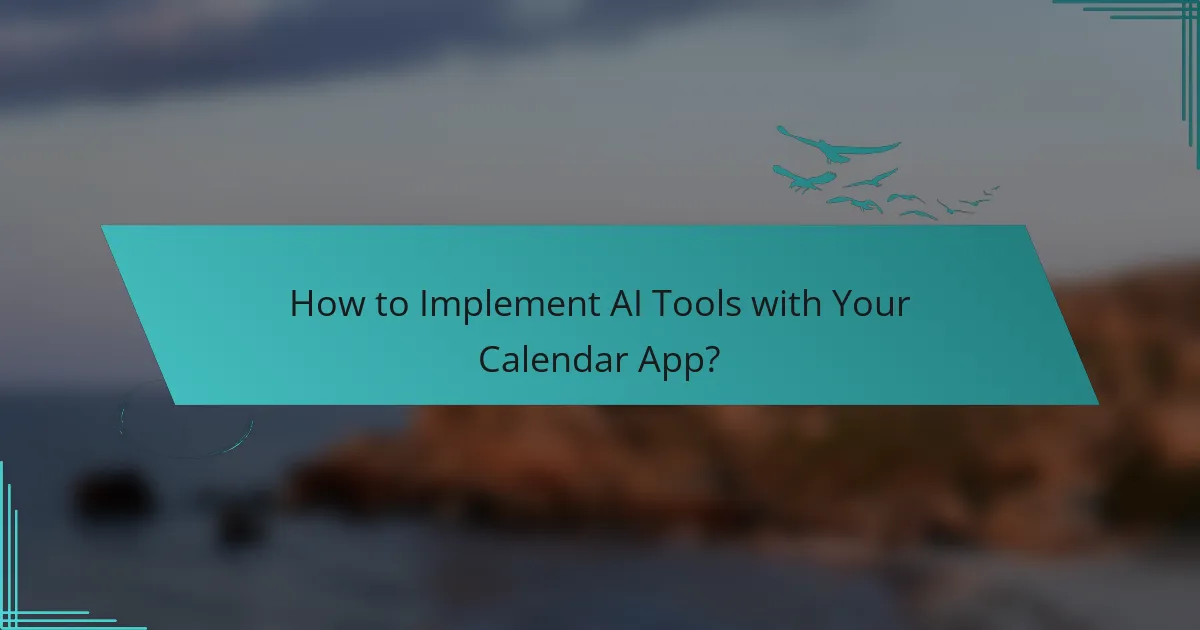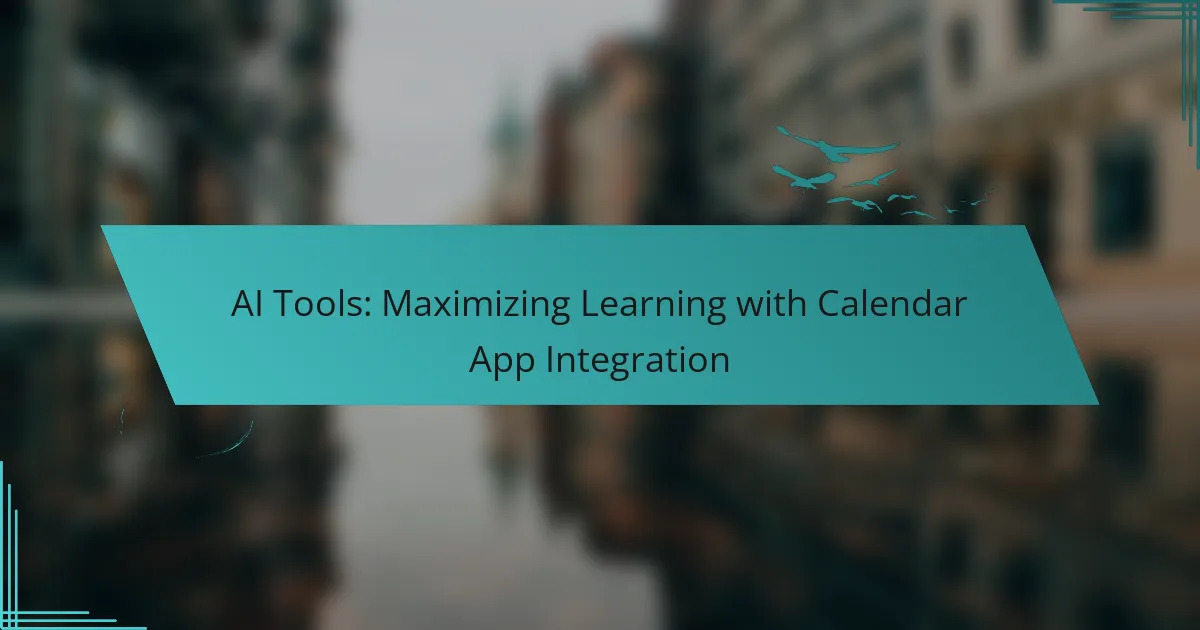Integrating AI tools with calendar apps can revolutionize the way we manage our time and tasks. By automating scheduling, sending smart reminders, and providing data insights, these tools enhance productivity and streamline organization. With options like Google Calendar, Microsoft Outlook, and Calendly, users can leverage unique AI features to optimize their planning process and reduce stress.

How Can AI Tools Enhance Calendar App Integration?
AI tools can significantly improve calendar app integration by automating scheduling, sending smart reminders, prioritizing tasks, providing data insights, and enhancing collaboration. These features streamline time management and increase productivity, making it easier to stay organized and focused.
Automated Scheduling
Automated scheduling uses AI algorithms to find optimal meeting times based on participants’ availability. By analyzing calendar data, these tools can suggest time slots that work for everyone, reducing the back-and-forth often involved in setting appointments.
For example, tools like Calendly or Microsoft Bookings can automatically sync with your calendar, allowing others to book meetings without the need for manual coordination. This can save several hours each week, especially for busy professionals.
Smart Reminders
Smart reminders leverage AI to send personalized notifications about upcoming events or deadlines. These reminders can be tailored based on user behavior, ensuring that important tasks are highlighted at the right time.
For instance, if you frequently miss meetings scheduled early in the morning, the AI can adjust reminder times to alert you the night before. This proactive approach helps prevent missed appointments and enhances overall time management.
Task Prioritization
AI can assist in task prioritization by analyzing deadlines, importance, and user preferences. This feature helps users focus on high-impact activities first, ensuring that critical tasks are completed on time.
Tools like Todoist or Trello integrate with calendar apps to automatically rank tasks based on urgency and relevance. By following these priorities, users can improve their productivity and reduce stress associated with overwhelming to-do lists.
Data Insights
Data insights generated by AI tools can provide valuable analytics on how time is spent. By reviewing patterns in calendar usage, users can identify areas for improvement, such as excessive meeting times or unproductive hours.
For example, a calendar app might reveal that meetings often run over time, prompting users to adjust their schedules. This reflective approach can lead to more efficient time management and better work-life balance.
Collaboration Features
Collaboration features powered by AI facilitate seamless teamwork by integrating calendars across different platforms. This allows teams to coordinate schedules, share availability, and manage joint tasks effectively.
Tools like Google Calendar enable users to create shared calendars, making it easier for teams to plan projects and track deadlines. This fosters a collaborative environment, ensuring everyone is aligned and informed about upcoming commitments.

Which AI Tools Are Best for Calendar Integration?
Several AI tools excel in calendar integration, enhancing scheduling efficiency and productivity. Key options include Google Calendar, Microsoft Outlook, Calendly, and Todoist, each offering unique features that leverage AI to streamline your planning process.
Google Calendar with AI Features
Google Calendar integrates AI to help users manage their schedules more effectively. Features like Smart Suggestions allow users to quickly find available times for meetings based on their preferences and past behavior.
Additionally, Google Assistant can create events through voice commands, making it convenient for users on the go. To maximize its potential, regularly update your calendar with accurate availability to improve the AI’s suggestions.
Microsoft Outlook AI Capabilities
Microsoft Outlook utilizes AI to enhance email and calendar functionalities, offering features like Focused Inbox and intelligent meeting scheduling. The Cortana assistant can suggest optimal meeting times based on participants’ availability, helping to reduce back-and-forth emails.
For best results, ensure your calendar is synced with your email and that you utilize the “FindTime” feature to propose multiple meeting options. This can save time and improve scheduling accuracy.
Calendly AI Scheduling
Calendly is designed specifically for scheduling meetings without the hassle of email exchanges. Its AI capabilities allow users to set their availability preferences, automatically suggesting times that work for all participants.
To effectively use Calendly, customize your availability settings and integrate it with your existing calendar apps. This ensures that your schedule is always up-to-date, minimizing conflicts and maximizing efficiency.
Todoist with AI Enhancements
Todoist incorporates AI to help users prioritize tasks and manage their time more effectively. The Smart Schedule feature suggests optimal times for completing tasks based on deadlines and your workload.
To leverage Todoist’s AI, regularly review and update your task list. This will enable the AI to provide better scheduling suggestions, ensuring that you stay on top of your commitments.

What Are the Benefits of Using AI-Integrated Calendar Apps?
AI-integrated calendar apps enhance scheduling efficiency by automating tasks and providing intelligent suggestions. They help users optimize their time, improve productivity, and reduce stress through smart features that adapt to individual needs.
Increased Productivity
AI-integrated calendar apps boost productivity by automating routine scheduling tasks. Features like smart reminders and automatic meeting scheduling allow users to focus on more critical tasks rather than administrative details.
For instance, these apps can analyze your work patterns and suggest optimal times for meetings, ensuring that your schedule aligns with your peak productivity hours. This targeted approach can lead to significant time savings, often freeing up several hours each week.
Time Management
Effective time management is a key benefit of AI-integrated calendar apps. They provide users with insights into how their time is allocated, helping identify areas where adjustments can be made for better efficiency.
By utilizing features such as time blocking and priority setting, users can allocate specific periods for focused work, meetings, and breaks. This structured approach can help maintain a balanced schedule and ensure that important tasks are not overlooked.
Reduced Stress
AI-integrated calendar apps can significantly reduce stress by simplifying the planning process. With automated scheduling and reminders, users are less likely to miss appointments or deadlines, leading to a more organized life.
Additionally, these apps can help users avoid overcommitting by providing insights into their availability. By visualizing their schedule, users can make informed decisions about taking on new tasks or meetings, ultimately leading to a more manageable workload.
Improved Collaboration
Collaboration is enhanced with AI-integrated calendar apps that facilitate seamless communication among team members. These tools often include features for shared calendars and scheduling, making it easier to coordinate meetings and projects.
For example, team members can view each other’s availability in real-time, reducing the back-and-forth typically involved in scheduling. This streamlined process not only saves time but also fosters a more collaborative environment, allowing teams to work together more effectively.

What Criteria Should You Consider When Choosing an AI Calendar Tool?
When selecting an AI calendar tool, focus on user interface, integration capabilities, cost, and customer support. These factors will significantly influence how effectively the tool meets your scheduling needs and enhances your productivity.
User Interface
The user interface (UI) of an AI calendar tool should be intuitive and easy to navigate. Look for features like drag-and-drop functionality, customizable views, and clear visual cues to help you manage your time efficiently.
Consider tools that offer mobile-friendly designs, allowing you to access your calendar on various devices. A well-designed UI can save you time and reduce frustration when scheduling or rescheduling events.
Integration Capabilities
Integration capabilities are crucial for maximizing the functionality of your AI calendar tool. Ensure that the tool can seamlessly connect with other applications you use, such as email clients, task managers, and video conferencing software.
Check for compatibility with popular platforms like Google Workspace, Microsoft 365, or Slack. The ability to sync across multiple tools can streamline your workflow and enhance productivity.
Cost and Pricing Plans
Evaluate the cost and pricing plans of AI calendar tools to find one that fits your budget. Many tools offer tiered pricing based on features, ranging from free basic versions to premium plans with advanced functionalities.
Consider whether the pricing aligns with your usage needs. For instance, if you require team collaboration features, investing in a higher-tier plan may be worthwhile. Always check for hidden fees or additional costs for integrations.
Customer Support
Reliable customer support is essential when using an AI calendar tool. Look for providers that offer multiple support channels, such as live chat, email, and phone assistance, to address any issues promptly.
Research user reviews to gauge the quality of customer service. A responsive support team can help you troubleshoot problems quickly and ensure you get the most out of your calendar tool.

How to Implement AI Tools with Your Calendar App?
Integrating AI tools with your calendar app can enhance productivity and streamline scheduling. This process involves assessing your specific needs and selecting the right AI tool that complements your calendar functionalities.
Step 1: Assess Your Needs
Begin by identifying the primary challenges you face with scheduling and time management. Consider whether you need assistance with reminders, meeting scheduling, or task prioritization. Understanding your requirements will help you select an AI tool that effectively addresses these issues.
Make a list of features you want, such as natural language processing for event creation or smart suggestions for optimal meeting times. This clarity will guide your decision-making process and ensure you choose a tool that aligns with your workflow.
Step 2: Choose the Right Tool
Research various AI tools that integrate with your calendar app, focusing on their features and user reviews. Popular options include tools that offer smart scheduling, automated reminders, and analytics on your time usage. Compare these tools based on ease of use, compatibility with your existing calendar, and pricing.
Consider testing a few tools through free trials to evaluate their effectiveness in your daily routine. Look for tools that provide seamless integration and enhance your calendar’s functionality without overwhelming you with unnecessary features.
